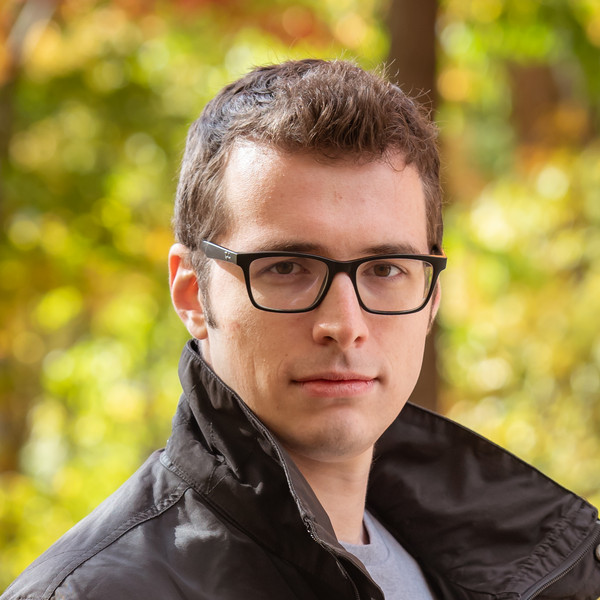Francis Lecavalier
Principal back-end developer at the Society for Arts and Technology (SAT)and bachelor’s degree in digital music (2018)

- Could you talk to us about your background?
I grew up in Châteauguay and I did my Cégep studies in computer sciences at Collège de Valleyfield. I’m a creative programmer and electronic composer. I work at the Society for Arts and Technology (SAT) in Montréal, as well as freelancing as a creative programmer.
Everything involved in technological and digital art excites me, and I have a special affinity for the world of sound. I’ve collaborated with artists in dance and in digital music and art. My programming creations have been part of works and installations presented internationally, at the festivals Montréal/New Musics, Suoni Per Il Popolo and FIMAV.
I was one of the performers of the sponge quintet by Martin Marier, and I was part of the three first cohorts of the Ensemble d’oscillateurs directed by Nicolas Bernier. I’m also one of the founding composers of Kolabacats, an experimental electronic music collective focusing on collaborative and decentralized composition.
At SAT I take part in the development and maintenance of Scenic, a free and open-source artistic telepresence software allowing for the low-latency transmission of audiovisual streams via the Internet. I was also one of the designers of Bibliolab, a telepresence device intended for public libraries prototyped by SAT in 2018.
- What was your favorite thing at the Faculty?
I had a great thirst for learning, and I can’t remember a single course that bored me! In addition to knowing their field as well as anyone, the professors and lecturers all maintain a varied and inspiring contemporary artistic practice. They’re also very accessible, generous and ready to listen to their students.
- Who are the people who inspired you the most during your university studies?
All my teachers inspired me in one way or another, but if I had to name just one person, that would be Patrick Saint-Denis. Patrick was my composition teacher during my last year of a bachelor’s in digital music. He always encouraged me in my projects, but never hesitated to question or criticize me if he saw that my ideas were flat or not going anywhere.
- In what way have your studies at the Faculty of Music influenced your life?
After my Cégep studies in computer sciences I was interested in developing my programming skills, but I also wanted to pursue my passion for music, which I kept going in a self-taught way. It was just then that I discovered the bachelor’s in digital music. It makes me laugh now, because I knew nothing about digital art or electroacoustic music!
My time at the Faculty opened my eyes. The many friends I made there and everything I learned are the foundation of my practice today. Despite my computer background, I wouldn’t have been able to get the position I fill today without my studies in digital music. All the hours spent programming sound processing software and designing audio-digital instruments gave me an expertise, a resourcefulness and a confidence that were key to my getting hired.
- How has the network that you built at the Faculty contributed to your career development?
My first creative programming contracts were given to me by people I met during my studies. Those mandates were vital in allowing me to acquire experience and build a portfolio worthy of the name. Even today, the people I dealt with at the Faculty continue to show tremendous generosity and be an incredible source of proposals!
- What advice would you give to a first-year student?
To savor every moment: you don’t realize how quickly a bachelor’s program goes by! I’d tell him to commit himself completely to his courses. And above all, I’d tell him not to be afraid to talk to people. It’s important to discuss things with your teachers, to get to know your fellow students and to attend shows and performances by artists in the field. That’s how you forge ties with people who, sometimes, can open doors down the road.
- And what advice would you give to someone about to graduate?
Don’t neglect to keep up your network of friends and colleagues from the Faculty in the future. It’s important to continue going to shows and performances by your colleagues, to keep your ears open to news from the professional community and to remain active in the music and faculty community. It’s a small world! Finally, I’d recommend that he trust his instincts and not be afraid to really go for it. The challenges of professional life are often intimidating, but not insurmountable. And if the obstacles seem too big, I advise him to face them with friends!
November 2020